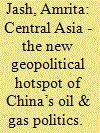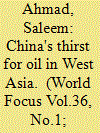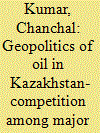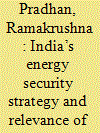|
|
|
Sort Order |
|
|
|
Items / Page
|
|
|
|
|
|
|
| Srl | Item |
| 1 |
ID:
136828


|
|
|
|
|
| Summary/Abstract |
Since the end of the Cold War and the decline of USSR, Central Asia, rich in oil and gas reserves has become the focus of national interest for global powers.The quest for energy has shifted the balance of power to the Central Asian Republics, making it an energy region of global importance. Of which, China’s increasing footprints in Central Asia, particularly in the energy sector, has drawn wide attention. Whereby, the region has risen from being a marginal factor to that of becoming a top priority in China’s foreign policy. It is guided by China’s vital interests to meet its expanding energy needs which face a supply crisis. In this dynamic, Central Asia has become a geopolitical opportunity for China to fulfil its political and economic objectives in the international arena.
|
|
|
|
|
|
|
|
|
|
|
|
|
|
|
|
| 2 |
ID:
136824


|
|
|
|
|
| Summary/Abstract |
It has been more than six month of Modi’s government where his energy policies are already being tested both in terms of foreign policy dimension with increased energy engagements with the outside world as well as with his domestic energy policies, which were often criticised as ineffective during the previous regimes, despite some opportunities which came through, but was lost due to domestic bureaucratic and political hurdles. This is particularly with respect to Indo-US Nuclear Deal grabbed during United Progressive Alliance (UPA) I. This deal is yet to see a light of a day.
|
|
|
|
|
|
|
|
|
|
|
|
|
|
|
|
| 3 |
ID:
136829


|
|
|
|
|
| Summary/Abstract |
However, oil remains the world’s most efficient mechanism for translating economic into geopolitical risk. In the modern era, no other COMMODITY has played such a pivotal role in driving political and economic turmoil, and there is every reason to expect this to be continued in future. The emerging powers rely upon finding more stable sources of supply.
|
|
|
|
|
|
|
|
|
|
|
|
|
|
|
|
| 4 |
ID:
136821


|
|
|
|
|
| Summary/Abstract |
Iraq today produces about a million barrels of oil more than it did in the immediate aftermath of the US-led invasion in 2003. In October 2012, the IEA predicted that Iraq’s production could double by 2020. Yet, in spite of the impressive recovery and vast potential of the Iraqi oil sector, its further development is constrained by insecurity, bureaucratic bottlenecks, infrastructure deficiencies, unresolved legal issues, and political disputes with the KRG.
|
|
|
|
|
|
|
|
|
|
|
|
|
|
|
|
| 5 |
ID:
136825


|
|
|
|
|
| Summary/Abstract |
Energy has emerged as the most important factor to shape geopolitics of Eurasia not only due to its value as a COMMODITY in supply but due to its role as an instrument to advance the strategic goals of global and regional powers in the Eurasian space. Central Asia due to its vast energy wealth is nowadays considered to be the key to the security of Eurasia. During the Cold War, Central Asian region was largely perceived as a peripheral space within the Soviet Union. The sameEurasian space has now become the object of the so-called ‘New Great Game’. This article will critically analyse Mackinder’s Heartland theory and will study what does the metaphor-New Great Game refer to. However, more than that, it is important to ask to what extent ‘New Great Game’ is correctly used to describe the geopolitical context and atmosphere of competition for access to the black gold in Central Asia. It is probably a myth that has been overtly or covertly nourished by novelists and commentators of geopolitics.
|
|
|
|
|
|
|
|
|
|
|
|
|
|
|
|
| 6 |
ID:
136830


|
|
|
|
|
| Summary/Abstract |
Central Asia has emerged as an important source of energy and strategic arena for the major powers of U.S., Russia and China where energy diplomacy has forged a major thrust in their foreign policy. Energy diplomacy in Central Asia is defined by the competition among various stakeholders and the mediation by the state in making the deal. Moreover, the energy diplomacy shares two common assumptions i.e. actors and factors. So, in the game of energy diplomacy in Central Asia, there are so many global and regional players involved out of which India is one of them. But in this game, how India has sought to strengthen its position with the involvement of major powers for accessing huge amount of energy resources from the region is lucidly explicated. Nevertheless, the article promptly attempts to draw a picture on India’s approach in Central Asian energy diplomacy.
|
|
|
|
|
|
|
|
|
|
|
|
|
|
|
|
| 7 |
ID:
136823


|
|
|
|
|
| Summary/Abstract |
The energy problem in Turkmenistan is primarily geopolitics and secondarily pipelines. The tertiary issues are economic, political and social implications. Gas deposits are strewn over all the country, generating aspirations nationwide for a better living and expectations worldwide how to use Turkmen energy. Turkmenistan has become the centre of attraction in Central Asia for all those who wish to pitch their hopes for energy with it. Proven gas reserves and many of its deposits are located in disputed areas of the Caspian Sea on which littoral states have failed to reach agreement on maritime borders. These fields remain either unexplored or under explored. There is an intense competition for energy security among regional and extra-regional powers. It has unleashed rivalries among large neighbors and distant superpowers. But for regional powers, interests extend much beyond commercial considerations. Turkmenistan being landlocked holds an important position in terms of energy MARKET because for transportation it has to depend on others. Turkmenistan has four pipeline options but all options have pros and cons. The paper is based on empirical studies as the author had visited the place and had interactions with high officials and laymen that helped frame the paper to deal with various aspects as to how sale of energy to outside world could improve the socio-economic condition of Turkmenistan.
|
|
|
|
|
|
|
|
|
|
|
|
|
|
|
|
| 8 |
ID:
136817


|
|
|
|
|
| Summary/Abstract |
The strong motivated ISIS is a indirectly, the creation of International Community. Had the international community taken early step and forced al-Assad to step down by supporting his democratic opponents, this monster would not have been there. Policies persuaded by the powers like Russia, China and America perpetuated the autocratic rulers al Assad in Syria and this made the entry and position of ISIS strong.
|
|
|
|
|
|
|
|
|
|
|
|
|
|
|
|
| 9 |
ID:
136822


|
|
|
|
|
| Summary/Abstract |
Central Asia has had its fair share of disputes between littoral states since its emergence from the former Soviet Union. Each state has subsequently sought to consolidate power in the region, using these disputes as leverage. Each incident that arises leads to new power struggles and fresh points of dispute between countries on topics such as economics, religion, politics and nationalist ideals. One important geopolitical consequence of the demise of the Soviet Union was the rise of an intense political and commercial competition for control of the vast energy resources of the newly independent and vulnerable states of the Caucasus and Central Asia.
|
|
|
|
|
|
|
|
|
|
|
|
|
|
|
|
| 10 |
ID:
136818


|
|
|
|
|
| Summary/Abstract |
This article aims to present the effect of the new alternative energy revolution globally to the traditionally held petro-power and their fading influence in the global political arena, the effect on the export of variants of religious fundamentalism and an array of issues revolving around the OIL politics and diplomacy globally. The paper also presents a way forward for the Indian government to enhance the energy equation and ensure the energy security for the growing Indian economy.
|
|
|
|
|
|
|
|
|
|
|
|
|
|
|
|
| 11 |
ID:
136816


|
|
|
|
|
| Summary/Abstract |
Central Asia having emerged as an important region of global energy scenario becomes a target of the Great Game Politics. While the presence of hydrocarbon resources were relatively known during the Soviet era, entry and explorations by major energy giants of the West during the last two decades has confirmed that Central Asia will be an additional, though not an alternative source for their growing energy needs. The Western firms initiated the politics and process of Multiple Pipeline network to have access to energy of Central Asia which has generated competition and conflict among major players. Being its southern underbelly, Russia’s energy giants with strong support of leadership, have been aggressively pursuing their economic and political interests in Central Asia. China has emerged as a major power having worked out a well planned and funded roadmap in Central Asia’s energy sector to meet its fast increasing demand. Russia and China have commonality of interests to counter the West which is keen to enhance its presence and acquire oil and gas bypassing Russia. The West is supported by leadership of Central Asia who want to diversify their market and promote their national interest. India, though late and not a major player, having close and cordial relations with the CAS, can and should explore various alternatives to meet its growing energy security needs from Central Asia.
|
|
|
|
|
|
|
|
|
|
|
|
|
|
|
|
| 12 |
ID:
136827


|
|
|
|
|
| Summary/Abstract |
In conclusion, India doesn’t have any country specific policy towards the Central Asian region. It needs to develop that part of its engagement with the region. Additionally, China cannot be ignored while dealing with Central Asia, as it largely factors in the regional trajectory of the region. India needs to include Chinese relevance in its Central Asian policy. India has already price for its in activeness and lack of broad vision in Kashmir, Tibet, Xinjiang, Myanmar and many more. It shouldn’t repeat them again in Central Asia.
|
|
|
|
|
|
|
|
|
|
|
|
|
|
|
|
| 13 |
ID:
136826


|
|
|
|
|
| Summary/Abstract |
Iran has often come forward to become an energy provider both for the Mediterranean (Turkey, Greece and Europe now dealing with new gas routes scenario) and for the Eastern Asian countries like Pakistan and India or Kazakhstan with which Iran is starting a cooperation on petrochemicals, oil and gas. Although its geographic position allows Iran to think big, conquering the Western countries' trust won't be easy. Let's consider for example the reduction of oil exportations in the first few months of 2014 following restrictions linked to the agreement on the easing of sanctions.
|
|
|
|
|
|
|
|
|
|
|
|
|
|
|
|
| 14 |
ID:
136819


|
|
|
|
|
| Summary/Abstract |
Energy will be a defining issue in international relations in the twentieth-first century, yet few political scientists have tackled the geopolitics of oil and gas. Oil diplomacy which is ruling world politics since nineties and becoming a hot issue of concern in global relations has also become an important aspect of Indian foreign policy. Thus to maintain good relations with our oil partners and building good relations with new partners is a great concern for India.
|
|
|
|
|
|
|
|
|
|
|
|
|
|
|
|
| 15 |
ID:
136815


|
|
|
|
|
| Summary/Abstract |
The Persian Gulf region has 63 percent of OIL and 39 percent of gas reserves globally. 45 percent of OECD oil is from the Gulf and the USA imports 60 percent from the Gulf. In 2003 oil exports from Gulf were 705 million tones. Oil production/ reserves outside Gulf are declining. At current rates of production, Gulf oil is likely to last at least for the next 50 years. Besides the Gulf region, the entire West Asia and North Africa also has substantial oil and gas resources. Due to this, the region has become the focus of attention especially of the USA. Oil was an important reason for US invasion of Iraq, in view of mounting threats from Al Qaeda in Saudi Arabia. This has led to growth of religious groups which are opposing regimes allied to West especially in the GCC, using terrorism to destroy oil facilities. The unresolved Arab-Israeli conflict and continued Palestinian sufferings has further aggravated this issue. Escalating US-Israeli threats to Iran, disintegration of Somalia, uncertainty in Yemen so on has led to growing maritime security threats. Thus, lack of democracy and related instability, religious extremism, terrorism, sectarianism, border disputes, human rights violations, besides the above reasons are the emerging threats. India imports over 70 % of oil needs and bulk of it comes from Gulf. There are nearly 5 million Indians in GCC states working and sending over $20 billion as remittances, Indo-GCC TRADE is of the order over $100 billion and from investment point of view GCC is important. At the same time, India has been affected by the oil shocks—at least six times in the last 35 years. The paper apart from highlighting the above issues will also discuss what measures need to be adopted to ensure India’s energy security.
|
|
|
|
|
|
|
|
|
|
|
|
|
|
|
|
| 16 |
ID:
136820


|
|
|
|
|
| Summary/Abstract |
To conclude that oil is one the most important sources of energy as well as bone of contention in West Asia. It has played out significant role in the geo-politics of the West Asian countries at the regional as well as international levels. The region has become an arena between the Super powers namely the United States as well as regional powers namely Iraq. The oil crisis of 1973 has forced the United States to take control of the West Asian oil and interfere in the regional politics.
|
|
|
|
|
|
|
|
|
|
|
|
|
|
|
|
|
|
|
|
|